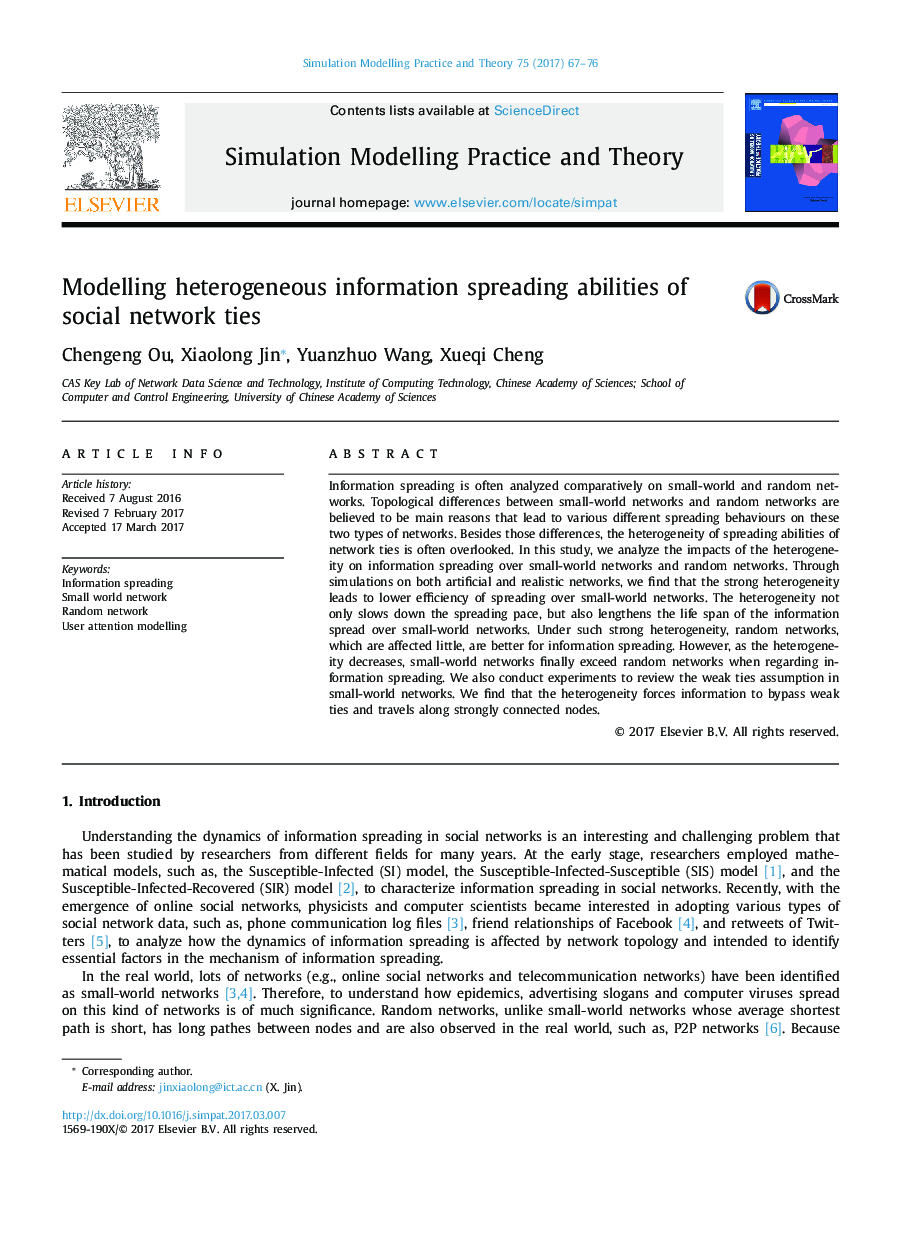| کد مقاله | کد نشریه | سال انتشار | مقاله انگلیسی | نسخه تمام متن |
|---|---|---|---|---|
| 4962626 | 1446652 | 2017 | 10 صفحه PDF | دانلود رایگان |
عنوان انگلیسی مقاله ISI
Modelling heterogeneous information spreading abilities of social network ties
ترجمه فارسی عنوان
مدلسازی اطلاعات ناهمگن توانایی های شبکه های اجتماعی را گسترش می دهد
دانلود مقاله + سفارش ترجمه
دانلود مقاله ISI انگلیسی
رایگان برای ایرانیان
کلمات کلیدی
گسترش اطلاعات، شبکه جهانی کوچک، شبکه تصادفی مدل سازی توجه کاربران،
ترجمه چکیده
گسترش اطلاعات اغلب در شبکه های کوچک و شبکه های تصادفی مقایسه می شود. اعتقاد بر این که تفاوت های توپولوژیکی بین شبکه های کوچک جهان و شبکه های تصادفی دلایل اصلی است که موجب رفتارهای مختلف گسترش در این دو نوع شبکه می شود. علاوه بر این تفاوت ها، ناهمگونی توانایی های گسترش روابط شبکه اغلب نادیده گرفته می شود. در این مطالعه، اثرات ناهمگونی را در گسترش اطلاعات شبکه های کوچک و شبکه های تصادفی بررسی می کنیم. از طریق شبیه سازی در هر دو شبکه مصنوعی و واقع بینانه، ما دریافتیم که ناهمگونی شدید منجر به کاهش بهره وری گسترش شبکه های کوچک جهان می شود. ناهمگونی نه تنها سرعت را افزایش می دهد، بلکه طول عمر اطلاعات گسترش شبکه های کوچک جهان را نیز افزایش می دهد. تحت چنین ناهمگونی شدید، شبکه های تصادفی که کم هستند، برای گسترش اطلاعات بهتر است. با این حال، به عنوان ناهمگونی کاهش می یابد، شبکه های کوچک جهان در نهایت در هنگام گسترش اطلاعات از شبکه های تصادفی عبور می کنند. ما همچنین آزمایش هایی را برای بررسی روابط ضعیف در شبکه های کوچک جهان انجام می دهیم. ما متوجه می شویم که ناهمگونی اطلاعات را برای دور زدن پیوندهای ضعیف و حرکت در کنار گره های متصل به هم متصل می کند.
موضوعات مرتبط
مهندسی و علوم پایه
مهندسی کامپیوتر
علوم کامپیوتر (عمومی)
چکیده انگلیسی
Information spreading is often analyzed comparatively on small-world and random networks. Topological differences between small-world networks and random networks are believed to be main reasons that lead to various different spreading behaviours on these two types of networks. Besides those differences, the heterogeneity of spreading abilities of network ties is often overlooked. In this study, we analyze the impacts of the heterogeneity on information spreading over small-world networks and random networks. Through simulations on both artificial and realistic networks, we find that the strong heterogeneity leads to lower efficiency of spreading over small-world networks. The heterogeneity not only slows down the spreading pace, but also lengthens the life span of the information spread over small-world networks. Under such strong heterogeneity, random networks, which are affected little, are better for information spreading. However, as the heterogeneity decreases, small-world networks finally exceed random networks when regarding information spreading. We also conduct experiments to review the weak ties assumption in small-world networks. We find that the heterogeneity forces information to bypass weak ties and travels along strongly connected nodes.
ناشر
Database: Elsevier - ScienceDirect (ساینس دایرکت)
Journal: Simulation Modelling Practice and Theory - Volume 75, June 2017, Pages 67-76
Journal: Simulation Modelling Practice and Theory - Volume 75, June 2017, Pages 67-76
نویسندگان
Chengeng Ou, Xiaolong Jin, Yuanzhuo Wang, Xueqi Cheng,
